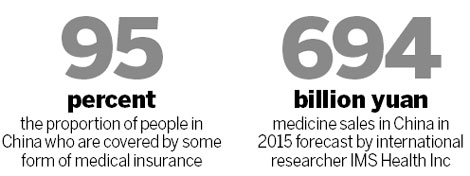Health is wealth, going private 'is the future'




|
 People stand in long lines to register at a children's hospital in Nanjing, Jiangsu province, on July 3. [Photo / China Daily]
|



Urbanization is the new calling card for foreign healthcare companies
Although China's rapid urbanization is putting a huge strain on the country's healthcare resources, it is also creating opportunities for foreign healthcare providers to sell products and services or provide training for their Chinese counterparts.
A rapid influx of population into urban centers has meant that cities are unable to provide adequate services in an orderly manner to all citizens, while an imbalance of funding in China's rural areas has resulted in poor healthcare services.
To solve these problems, China has embarked on serious healthcare reform in recent years. Key measures include the development of healthcare infrastructure in China's lower-tier cities and rural areas, as well as insurance plans, through which more than 95 percent of the population now has some form of coverage.
Such encouraging signs are set to continue, as confirmed in a speech delivered in late 2011 by then vice-premier Li Keqiang. Li outlined the government's commitment to establish a universal basic healthcare system providing "safe, effective, convenient and low-cost" healthcare services by 2020.
One current challenge for China's urban centers is congestion and the long waiting times in urban hospitals because of a rapid influx of population in cities and a lack of a robust primary care system that encourages residents to see their local healthcare providers first.
"Lack of a good primary care infrastructure system means that most patients go directly to China's 3-A hospitals in big cities, instead of going to their local healthcare providers first. This creates a misuse of precious resources," says Zhu Hengpeng, a professor at the Chinese Academy of Social Sciences.
Key problems
"The key problem with primary care is the poor level of services and healthcare expertise common among primary care providers. The health risks associated with inappropriate medicine prescription at primary care providers is also greater."
He says the key to reform is to improve the quality of primary care provision and allow more private sector players to enter this market and improve quality through competition.
Liu Yuanli, director of Harvard School of Public Health China Initiative, says that a key aspect of healthcare reform is to make sure that patients trust the primary service providers' level of expertise.
"I once undertook a study in Shanghai's big hospitals, and found that more than 30 percent of patients that went there were not ill to the extent they needed to receive treatment from big hospitals. They went because they could not trust primary care providers," Liu says.





















